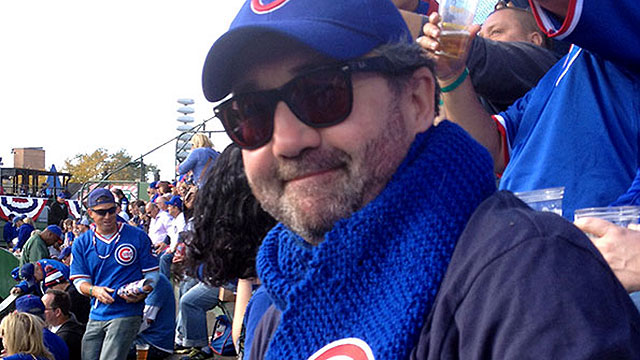Bill Savage is a Northwestern alumnus and associate professor and adviser for the Weinberg College of Arts and Sciences. He’s also a scholar of literary and popular culture, as well as a widely published writer. But perhaps most important, Savage is a lifelong Chicago Cubs fan and baseball historian.
A member of the Society for American Baseball Research, Savage wrote a number of columns for ESPN this summer about the experience of watching the team from a fan’s perspective.
A season ticket-holder at Wrigley Field since 1992, Savage sat down with Northwestern magazine’s Josh Rosenblat for a discussion about the Cubs’ first trip to the World Series since 1945, where the team is facing the Cleveland Indians.
RELATED: Visit Northwestern magazine for a longer interview with Savage.
With Cleveland and Chicago, you have two teams that have failed to win a World Series for a combined 174 years. What is the historical significance of this World Series?
I don’t know that baseball is one of those things where you can say, ‘What is the historical significance of this?’ For the individual teams and the fans, it’s got significance. But, baseball is not a moral enterprise. It’s like nature. It’s amoral. It happens. … While histories of the game will record that after this World Series one of these two long droughts is over, it’s not a moral enterprise. It’s a business. It’s a game.
Would you say this is the best Cubs team of your lifetime?
Absolutely. With the depth of the pitching and the hitting and the bench and the innovative managing that [Joe] Maddon brings to the table, this is by far the best team.
I know I said I wouldn’t talk about it, but not talking about it is talking about it: The stupid curse narratives are nonsense. The reason the Cubs haven’t won the World Series since 1908 and haven’t been to one since 1945 isn’t supernatural. It’s just that bad owners, bad general managers, bad managers and bad players equal losing. Now the Cubs have owners who seem to know what they’re doing, a general manager who knows what he’s doing, a field manager who knows what he’s doing and a whole lot of good players. So, they’re not winning because of some magic. They’re winning because they’re good.
Was there ever a point when you’re watching, having gone through the playoff losses before, and you say, ‘Here we go again?’ Or, have you conditioned yourself not to fall into that trap?
I don’t know that it’s a trap because that’s just baseball as a reality. The difference between this team and the teams you’ve mentioned is their resilience, their come-from-behind ability. In most of the bad years with the Cubs, if you were behind after the seventh inning, you knew you were going to lose. Now, you don’t feel that way anymore. And that’s not because of some magic transformation but because of the game where they clinched against the Giants. [The Cubs scored four runs in the top of the ninth inning to clinch the National League Division Series on Oct. 11.] There have been many, many, many walk-off wins [this season.] … It’s a different feeling. But that feeling isn’t based on the supernatural. It’s based on evidence of performance.
So they’ve shaken the “Lovable Losers” narrative?
In terms of the dominant narrative of “lovable losers,” the Cubs were in 10 of the first 40 World Series. Along with the Giants and the Pirates, they dominated the first decades of the 20th century. But they ran into teams that were better than they were in the World Series, repeatedly.
Then, the dry years from 1945 to 1984, there was bad ownership. But that bad ownership saved Wrigley Field. If the Wrigleys wanted to make a lot of money and put a winning team on the field, they would have asked for a new stadium by an interstate on-ramp with a bunch of parking lots. Instead, they sold people on the experience of Wrigley Field: baseball in the sunshine, come have a picnic, you’ll have a good time at the Friendly Confines. Yeah, the team will be terrible, but you’re not just here for the team, you’re here for the ballpark.
So that’s why we still have Wrigley Field. So it’s kind of a deal with the devil, in some sense. Losing baseball games, in some way, enabled the team and the fans to win by having this historic park still.
Also, the Cubs have gotten to the playoffs. And getting to the playoffs several times every decade [since the ’80s], is pretty good for most teams, except if you’re the Cardinals. So this isn’t a loser narrative. It’s an only-one-team-can-win narrative.


